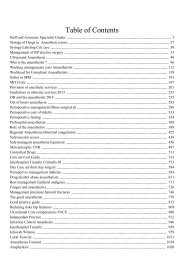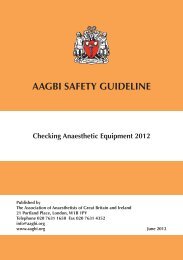pdfjoiner
Create successful ePaper yourself
Turn your PDF publications into a flip-book with our unique Google optimized e-Paper software.
Anaesthesia 2015<br />
Barker et al. | Guidelines on peri-operative management of diabetes<br />
until alternative subcutaneous insulin has been administered.<br />
Metformin<br />
A number of guidelines available for the use of<br />
metformin recommend withdrawing treatment peri-operatively.<br />
However, evidence for this approach is lacking<br />
and there is some evidence that peri-operative continuation<br />
of metformin is safe. Metformin is renally excreted<br />
and renal failure may lead to high plasma levels which<br />
are associated with an increased risk of lactic acidosis<br />
[34]. Metformin should be withheld if there is pre-existing<br />
renal impairment or significant risk of the patient<br />
developing acute kidney injury. Anaesthetists should be<br />
vigilant about the dangers of the use of nephrotoxic<br />
agents, including contract media [35].<br />
Non-steroidal anti-inflammatory drugs (NSAIDs)<br />
There are several additional considerations to the use<br />
of NSAIDs in patients with diabetes, including the<br />
redistribution of renal blood flow in the presence of<br />
hypovolaemia and the risk of oedema, especially if<br />
given concurrently with metformin and glitazones.<br />
Quality control and audit<br />
A number of bodies have published quality standards<br />
pertinent to the peri-operative care of patients with diabetes.<br />
These include NICE, the Royal College of Anaesthetists<br />
(RCoA) and NHS Diabetes (the latter no longer<br />
exists and the Joint British Diabetes Societies Inpatient<br />
Care Group has taken over some of its roles).<br />
National Institute for Health and Care<br />
Excellence<br />
Quality Standard 6, Diabetes in Adults, includes an<br />
auditable standard relating to inpatient care: “People<br />
with diabetes admitted to hospital are cared for by<br />
appropriately trained staff, provided with access to a<br />
specialist diabetes team, and given the choice of selfmonitoring<br />
and managing their own insulin” [36].<br />
Royal College of Anaesthetists<br />
The RCoA’s Guidelines for the Provision of Anaesthetic<br />
Services [37] contains much advice relating to the perioperative<br />
care of patients, including those with diabetes.<br />
In addition, the RCoA publication Raising the<br />
Standard – a Compendium of Audit Recipes contains<br />
details on audit and quality improvement topics pertinent<br />
to patients with diabetes [38]. These focus on<br />
peri-operative care and are suitable for use by anaesthetists<br />
wishing to assess the quality of local provision.<br />
For example, topics include availability of guidelines<br />
for, and management of, chronic medication during<br />
the peri-operative period, and peri-operative fasting.<br />
NHS Diabetes<br />
The NHS Diabetes guideline contains a number of<br />
suggested audit standards covering medication, safety,<br />
training and institutional issues [1].<br />
National Diabetes Inpatient Audit<br />
Whilst the audit standards suggested above may be<br />
used within an organisation, national audit projects<br />
provide a broader picture and allow benchmarking.<br />
The National Diabetes Inpatient Audit (NaDIA) is an<br />
annual snapshot audit of surgical and medical inpatients<br />
with diabetes. The majority of Trusts in<br />
England and Wales are now taking part. The audit is<br />
commissioned by the Healthcare Quality Improvement<br />
Partnership as part of the National Clinical Audit and<br />
Patient Outcomes Programme. The results are available<br />
online in the spring of each year and enable<br />
organisations to assess their performance in caring for<br />
inpatients with diabetes [39].<br />
Included in the audit are questions relating to<br />
whether diabetes management minimises the risk of<br />
avoidable complications, harm resulting from the<br />
inpatient stay, patient experience and the change in<br />
patient feedback on the quality of care since<br />
NaDIA began. Of particular relevance to anaesthetists,<br />
NaDIA includes comparative data on the prevalence of<br />
medication errors, intravenous insulin infusions, glycaemic<br />
control and patient harm. In addition, there<br />
are considerable data from patients’ feedback questionnaires<br />
concerning their experience and involvement in<br />
their own care.<br />
• Recommendation: Anaesthetists interested in perioperative<br />
diabetes management should access the<br />
National Diabetes Inpatient Audit and look up the<br />
results for their own organisation.<br />
10 © 2015 The Authors. Anaesthesia published by John Wiley & Sons Ltd on behalf of Association of Anaesthetists of Great Britain and Ireland





